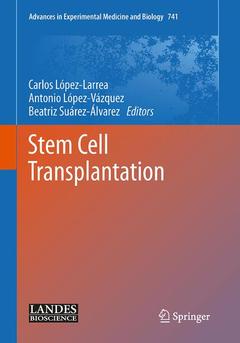Description
Stem Cell Transplantation, Softcover reprint of the original 1st ed. 2012
Advances in Experimental Medicine and Biology Series, Vol. 741
Coordinators: López-Larrea Carlos, López Vázquez Antonio, Suárez Álvarez Beatriz
Language: English
Subjects for Stem Cell Transplantation:
Keywords
Cell Therapies; Embryonic Cell; López-Larrea; Stem Cell; Transplantation
Publication date: 11-2016
Support: Print on demand
342 p. · 17.8x25.4 cm · Paperback
Description
/li>Contents
/li>Biography
/li>Comment
/li>
The Frontiers of Organ Transplantation and Cell Therapy.- Organ Transplantation in the 21st Century.- Immunology and the Challenge of Transplantation.- Cellular Immunotolerance in the Transplant.- Immunosuppression in the Era of Biological Agents.- Transgenic Organs and Xenotransplants.- Cell and Tissue Therapy in Regenerative Medicine.- Characteristics of Adult Stem Cells.- Bone Marrow Transplantation Extends its Scope.- Biology of Stem Cells: The Role of Microenvironments.- Mobilization and Homing of Hematopoietic Stem Cells.- Great Promise of Tissue‑Resident Adult Stem/Progenitor Cells in Transplantation and Cancer Therapies.- Multipotent Mesenchymal Stromal Cells: Clinical Applicat Ions and Cancer Modeling.- Neural Stem Cells and Transplantation Studies in Parkinson’s Disease.- Biological Impact of Humanembryoni C Stem Cells.- Epigenetics of Embryoni C Stem Cells.- New Tools in Regenerative Medicine: Gene Therapy.- Therapeutic Cloning and Cellular Reprogramming.- Advances in Stem Cell Therapy.- Tissue Bioengineering and Artificial Organs.
Carlos López-Larrea is Professor of Immunology (Oviedo, Spain) and currently Head of the Department of Immunology at the Hospital Universitario Central de Asturias (Oviedo, Spain). He is a world expert on spondyloarthropathies (SpA), in particular MHC and genetic factors that influence the development of the disease. The main research interests of his group also currently include the study of epigenetic mechanisms involved in autoimmune diseases and the role of innate immunity in organ transplantation tolerance. He is a member of several international scientific organizations and board member of several scientific journals. He has published more than 150 international papers and book chapters related to immunology and spondylaorthropathies.
Antonio López-Vázquez, MD obtained the degree of Doctor of Medicine in the University of Navarra (Spain) in 1991. Currently, he is an Immunologist in the Department of Immunology of Hospital Universitario Central de Asturias in Oviedo (Spain). He specializes in histocompatibility and autoimmune diseases. Dr. López‑Vázquez’s areas of interest investigation include organ transplantation, celiac disease and HCV infection.
Beatriz Suárez‑Álvarez is a research associate in the Histocompatibility Unit of the Immunology Service at the Hospital Universitario Central de Asturias (Oviedo, Spain). She obtained her PhD degree in Biology Sciences (Biochemistry and Molecular Biology) at the University of Oviedo, Spain. Her research project mainly focuses on the regulation of the Major Histocompatibility Complex during the differentiation of human embryonic and induced pluripotent stem cells to different cell types. Her research is based on the study of the epigenetic mechanisms involved in the regulation of genes of the immune system and their role in the development of immune tolerance during transplantation and autoimmune diseases.




